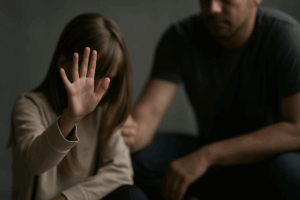Revenge Porn: Should the law punish it as a sex crime?
By Sacha Withey, Dr Don Macfarlane and Tamara Davis (SBP Law)
WARNING: This article may be regarded by many as unpleasant, concerning, and unsettling. Nonetheless, it is our duty to ensure that victims of Revenge Porn are protected within the law.
Revenge porn is a criminal offence under Section 33 of the Criminal Justice and Courts Act 2015. If found guilty, individuals may face up to two years in prison. However, legal experts and campaigners increasingly argue that revenge porn should be recognised as a sexual offence, especially given the nature of harm it causes. If you are a victim or unsure of your legal options, we strongly recommend consulting a solicitor specialising in sexual offences or image-based abuse.

What is revenge porn?
In an age of affordable mobile technology, an intimate picture taken in private can — by quite literally the click of a finger — become public. This has led to the non-consensual sharing of explicit or sexual images or videos, colloquially known as revenge porn.
- Though victims are disproportionately women, 27% of callers to the Revenge Porn Helpline have been male.
- The Criminal Justice and Courts Act 2015 (CJCA) specifies that:
- The sharing must be non-consensual.
- The content must be considered private, not usually seen in public.
- The content must be sexual, including exposure of genitals or sexually suggestive poses.
For example, the possession of sexually explicit material may be used by perpetrators to:
- Blackmail the individual.
- Coerce them into continuing a relationship.
- Publicly embarrass the victim for ending a relationship.
- Silence them with the threat of wide-scale distribution to family, friends and employers.
UK surge in revenge porn during lockdown
The COVID-19 lockdown triggered a notable increase in revenge porn incidents. Social media’s prevalence as a communication tool only intensified this trend.
Although the CJCA 2015 criminalised the practice, it carries only a two-year maximum sentence. This is considered inadequate by many legal experts, given the lasting psychological harm it causes.
The tragic case of Alice Ruggles (2016), who was murdered by her boyfriend after threats to share intimate images, remains a stark reminder of the potential dangers.
What is the current legal position?
According to the BBC (2018):
- 1 in 3 allegations of revenge porn are withdrawn before reaching court.
- Since 2015, 2,813 out of 7,806 reported incidents were not pursued by victims.
Why such a gap between reports and prosecutions?
- Social stigma: Victims fear being blamed for taking the photos.
- Fear of exposure: Victims risk further shame when cases go public.
- Misunderstanding: Many don’t realise that non-consensual sharing, not the creation of the images, is the offence.
The CJCA 2015 even allows prosecution if the victim is fully clothed but sexually posed.
What needs to change — and why?
The rise of social media and sexting means revenge porn will likely increase, especially among minors.
- Apps like Snapchat offer a false sense of privacy.
- Screenshots or screen recordings mean content can become permanent.
From a prevention standpoint:
- People likely won’t stop sharing intimate images.
- Instead, education must be prioritised — especially in schools — to build awareness and responsibility.
Legislative shortcomings & developments (2023–2025)
The Online Safety Act 2023 and new CPS guidance (2024) introduced key changes:
– Revenge porn is no longer just about causing distress.
– It is now a crime to share intimate images without consent regardless of intent.
– Three legal categories now exist:
- Sharing without consent.
- Sharing to cause alarm, distress, or humiliation.
- Sharing for sexual gratification.
Victims now benefit from anonymity protections under the Sexual Offences Act.
Additional updates include:
The Non-Consensual Sexually Explicit Images and Videos (Offences) Bill (2024–25) seeks to criminalise:
- Creation and solicitation of deepfake or AI-generated explicit content.
- Screenshots or digitally altered images meant to mimic real content.
These efforts aim to close the loophole where creation was not previously a crime.
Should revenge porn be a sexual offence?
Currently, revenge porn is categorised under communications offences, which denies victims:
- Automatic anonymity.
- The protections offered in sexual offence trials.
Reframing it as a sexual crime would provide:
- Increased victim protections.
- Better sentencing.
- Recognition of the true nature of the harm caused.
Do I need a solicitor for a revenge porn Case?
Whether you’re a victim or accused, a solicitor plays a critical role in protecting your rights and navigating legal complexities:
For victims, a solicitor can:
- Secure emergency injunctions to stop further image sharing.
- Liaise with police and CPS to build a strong case.
- Apply for anonymity and protection under sexual offence rules.
- Assist with claims for compensation, including psychological harm.
- Collect digital evidence (screenshots, URLs, timestamps) and liaise with platforms for content removal.
For accused individuals, a solicitor can:
- Defend against false accusations.
- Verify the context and intent of image sharing.
- Present mitigating circumstances to reduce sentencing.
- Prevent reputational damage through strategic legal advice.
Given the evolving laws and societal impact, having a specialist solicitor ensures the case is handled with expertise, discretion, and efficiency.
KEY TAKEAWAYS
There’s a disconnect between the devastating impact of revenge porn and the legal consequences. With modern technologies making sharing easier than ever, legal reforms are essential.
Rather than shaming victims, we must:
- Offer clear legal pathways.
- Educate both the public and the judiciary.
- Reform legislation to recognise this offence for what it is: a form of sexual abuse.
If you believe you are a victim, report it to the police. If you seek compensation or civil action, contact one of our expert sexual offence solicitors.
Support & Helplines: If you need help, these services can provide confidential support and practical advice:
















